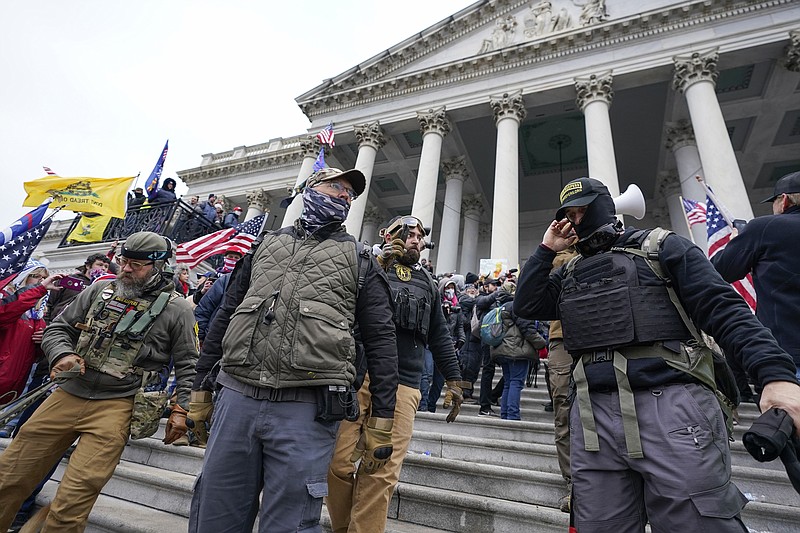WASHINGTON -- The founder of the Oath Keepers extremist group and four associates planned an "armed rebellion" to keep President Donald Trump in power, a federal prosecutor contended Monday as the most serious case yet went to trial in the Jan. 6, 2021, attack on the U.S. Capitol.
Stewart Rhodes and his band of extremists were prepared to go to war to stop Joe Biden from becoming president, Assistant U.S. Attorney Jeffrey Nestler told jurors. The group celebrated the Capitol attack as a victory in that fight and continued their plot even after Biden's electoral victory was certified, Nestler alleged.
"Their goal was to stop, by whatever means necessary, the lawful transfer of presidential power, including by taking up arms against the United States government," the prosecutor said during his opening statement. "They concocted a plan for armed rebellion to shatter a bedrock of American democracy."
The defendants are the first among hundreds of people arrested in the Capitol riot to stand trial on seditious conspiracy, a rare Civil War-era charge that calls for up to 20 years behind bars. The stakes are high for the Justice Department, which last secured such a conviction at trial nearly 30 years ago, and intends to try two more groups on the charge later this year.
The trial comes as Trump continues to insist, against much evidence, that the 2020 election was stolen from him, and as vocal pushback against the charges filed against those who entered the Capitol continues in some quarters. The broader reaction could show how the American public, as well as the jury, sees the attack, nearly two years later.
Defense attorneys accused prosecutors of cherry-picking comments from messages and videos and said the government has no evidence there ever was any plan to attack the Capitol. Rhodes' attorney said his client will take the stand and show that the Oath Keepers had merely been preparing for orders they expected from Trump but never came.
"Stewart Rhodes meant no harm to the Capitol that day. Stewart Rhodes did not have any violent intent that day," Rhodes' attorney, Phillip Linder, said. "The story the government is trying to tell you today is completely wrong."
On trial with Rhodes, of Granbury, Texas, are Kelly Meggs, leader of the Florida chapter of the Oath Keepers; Kenneth Harrelson, another Florida Oath Keeper; Thomas Caldwell, a retired U.S. Navy intelligence officer from Virginia, and Jessica Watkins, who led an Ohio militia group. They face several other charges as well.
They are among roughly 900 people who have been charged in the attack, which temporarily halted the certification of Biden's victory, sent lawmakers running for cover and left dozens of police officers injured.
In the Oath Keepers case, prosecutors will try to prove that their actions were not a spontaneous outpouring of election-fueled rage but part of a detailed, drawn-out plot to stop Biden from entering the White House.
The Oath Keepers "were prepared in November, they were prepared in December and when the opportunity finally presented itself on Jan 6, 2021, they sprang into action," Nestler said.
Among those who may testify during the trial, which will last several weeks, are three Oath Keepers who've pleaded guilty to seditious conspiracy and are cooperating with prosecutors in hopes of getting lighter sentences. They include a man who says that after arriving in Washington, Meggs told him that another Florida Oath Keeper had brought explosives in his RV.
The government's first witness was a FBI agent, who responded on Jan. 6 to help rescue senators. He described lawmakers crying, broken doors and windows and a scene that "looked like a bomb had gone off."
Defense lawyers say prosecutors have ripped the Oath Keepers' messages out of context to paint them unfairly. The Oath Keepers came to Washington to provide security at events for figures such as Stone before the president's big outdoor rally behind the White House, defense lawyers said. Rhodes' attorney described the group as a "peacekeeping" force and called his client an "extremely patriotic" man who "loves this country."
Rhodes' attorneys plan to argue that Rhodes believed Trump was going to going to invoke the Insurrection Act and call up a militia, which Rhodes had been calling on him to do to stop Biden from becoming president. Rhodes' lawyers have said he was merely lobbying the president to invoke a U.S. law.
Prosecutors say it's clear the Oath Keepers were going to act regardless of what Trump did. Nestler told jurors that Rhodes, a Yale Law School graduate, was only using the Insurrection Act as "legal cover." In one message, Rhodes wrote in December 2020 that Trump "needs to know that if he fails to act, then we will."
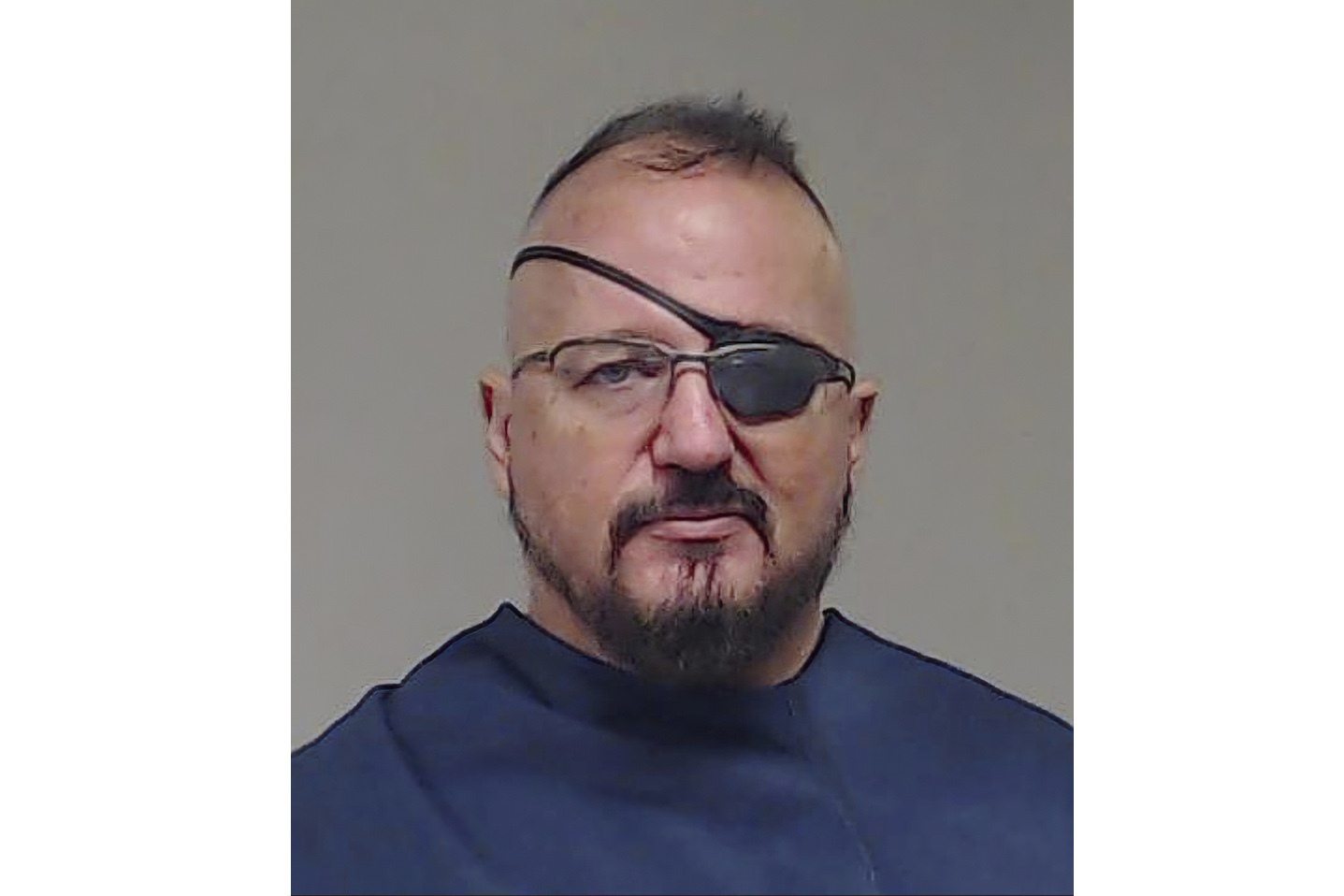 FILE - This photo provided by the Collin County Sheriff's Office shows Stewart Rhodes. Federal prosecutors are preparing to lay out their case against the founder of the Oath Keepers’ extremist group and four associates. They are charged in the most serious case to reach trial yet in the Jan. 6, 2021, U.S. Capitol attack. Opening statements are expected Monday in Washington’s federal court in the trial of Stewart Rhodes and others charged with seditious conspiracy. (Collin County Sheriff's Office via AP, File)
FILE - This photo provided by the Collin County Sheriff's Office shows Stewart Rhodes. Federal prosecutors are preparing to lay out their case against the founder of the Oath Keepers’ extremist group and four associates. They are charged in the most serious case to reach trial yet in the Jan. 6, 2021, U.S. Capitol attack. Opening statements are expected Monday in Washington’s federal court in the trial of Stewart Rhodes and others charged with seditious conspiracy. (Collin County Sheriff's Office via AP, File)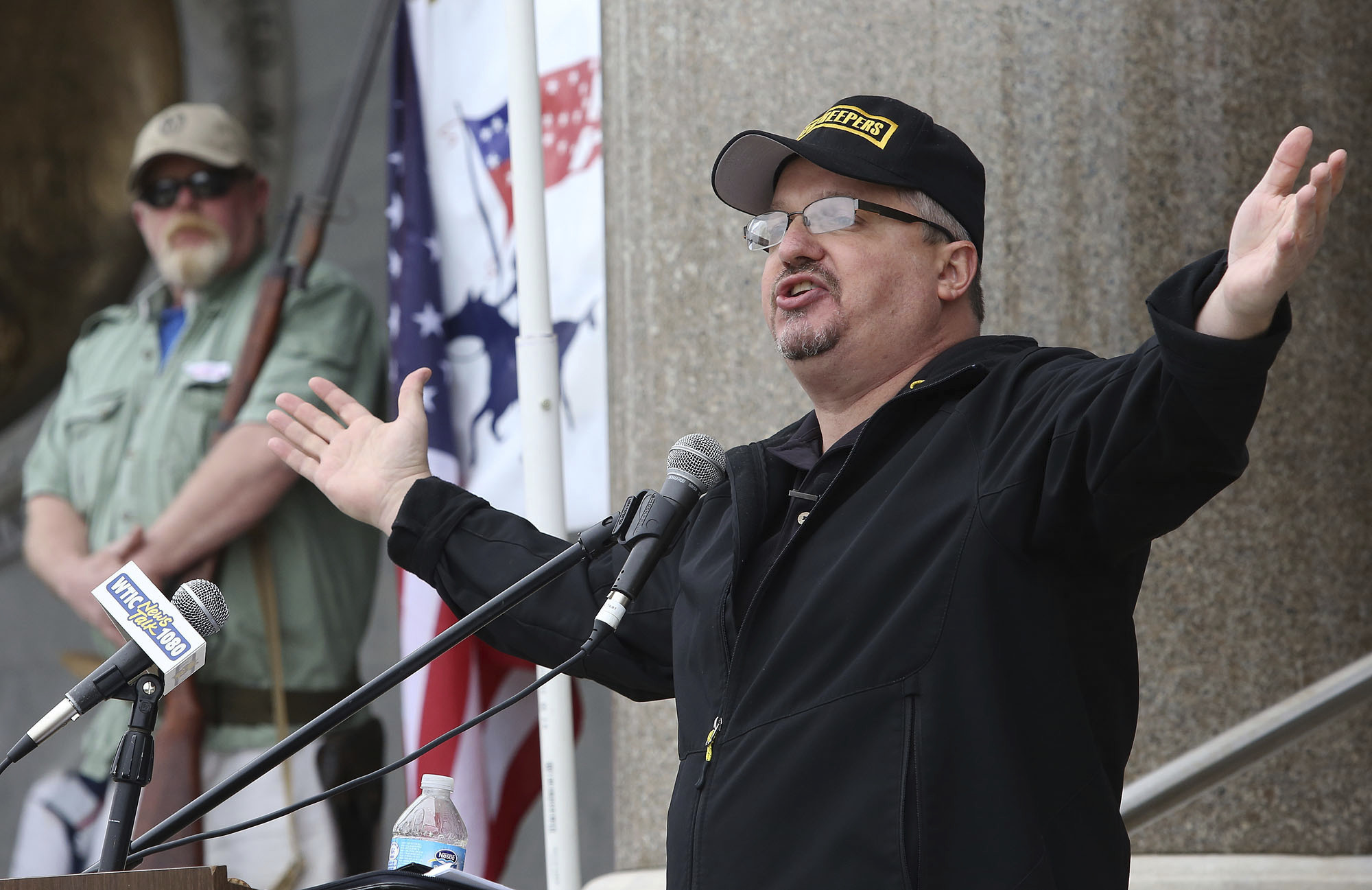 FILE - Stewart Rhodes, the founder of Oath Keepers, speaks during a gun rights rally at the Connecticut State Capitol in Hartford, Conn., April 20, 2013. Federal prosecutors are preparing to lay out their case against the founder of the Oath Keepers’ extremist group and four associates. They are charged in the most serious case to reach trial yet in the Jan. 6, 2021, U.S. Capitol attack. Opening statements are expected Monday in Washington’s federal court in the trial of Stewart Rhodes and others charged with seditious conspiracy. (Jared Ramsdell/Journal Inquirer via AP)
FILE - Stewart Rhodes, the founder of Oath Keepers, speaks during a gun rights rally at the Connecticut State Capitol in Hartford, Conn., April 20, 2013. Federal prosecutors are preparing to lay out their case against the founder of the Oath Keepers’ extremist group and four associates. They are charged in the most serious case to reach trial yet in the Jan. 6, 2021, U.S. Capitol attack. Opening statements are expected Monday in Washington’s federal court in the trial of Stewart Rhodes and others charged with seditious conspiracy. (Jared Ramsdell/Journal Inquirer via AP)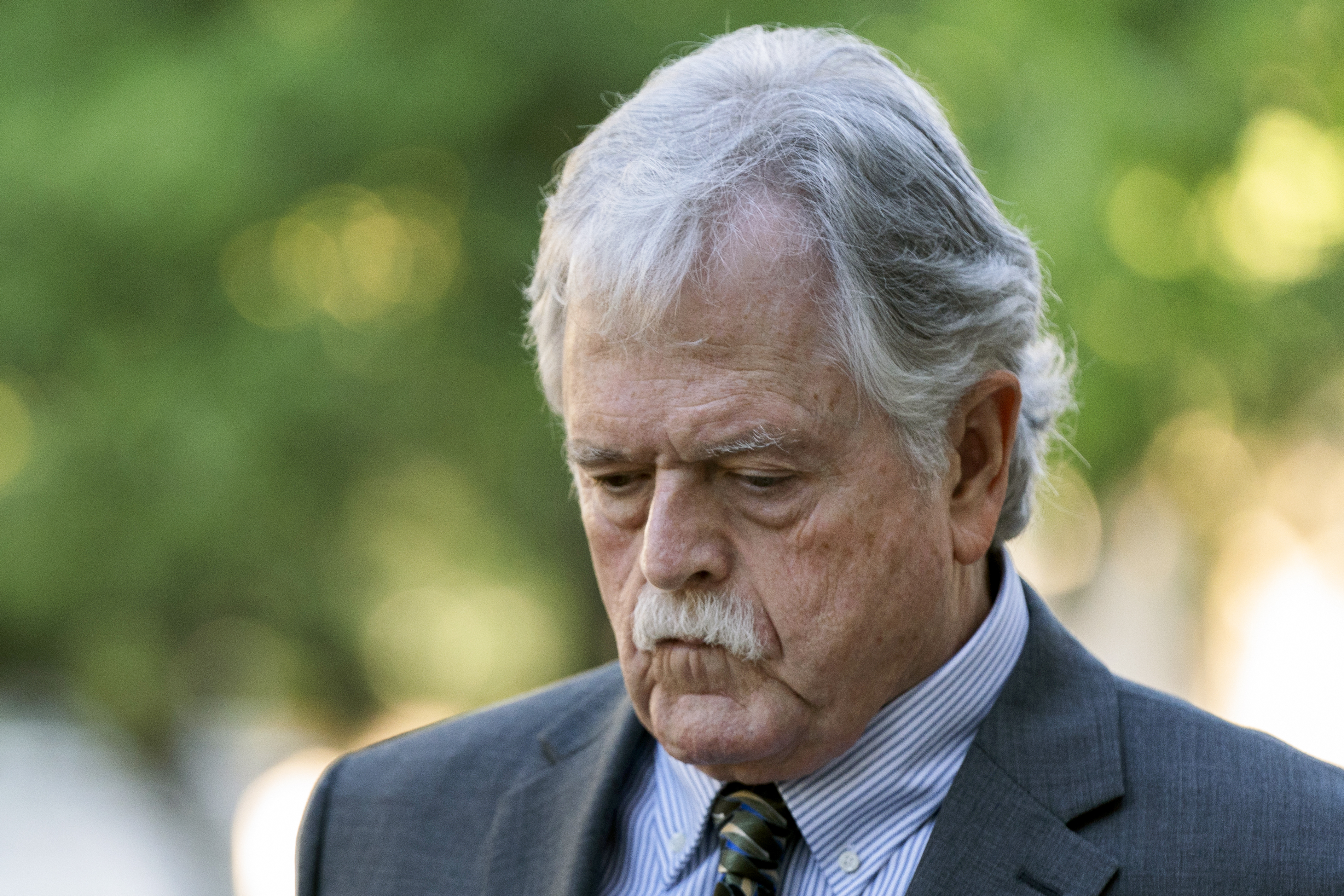 FILE - Thomas Caldwell of Berryville, Va., a defendant charged with seditious conspiracy in one of the most serious cases to emerge from the Jan. 6, 2021 attack on the U.S. Capitol, arrives at the federal courthouse, Sept. 28, 2022, in Washington. Federal prosecutors are preparing to lay out their case against the founder of the Oath Keepers’ extremist group and four associates. They are charged in the most serious case to reach trial yet in the Jan. 6, 2021, U.S. Capitol attack. Opening statements are expected Monday. (AP Photo/Manuel Balce Ceneta, File)
FILE - Thomas Caldwell of Berryville, Va., a defendant charged with seditious conspiracy in one of the most serious cases to emerge from the Jan. 6, 2021 attack on the U.S. Capitol, arrives at the federal courthouse, Sept. 28, 2022, in Washington. Federal prosecutors are preparing to lay out their case against the founder of the Oath Keepers’ extremist group and four associates. They are charged in the most serious case to reach trial yet in the Jan. 6, 2021, U.S. Capitol attack. Opening statements are expected Monday. (AP Photo/Manuel Balce Ceneta, File)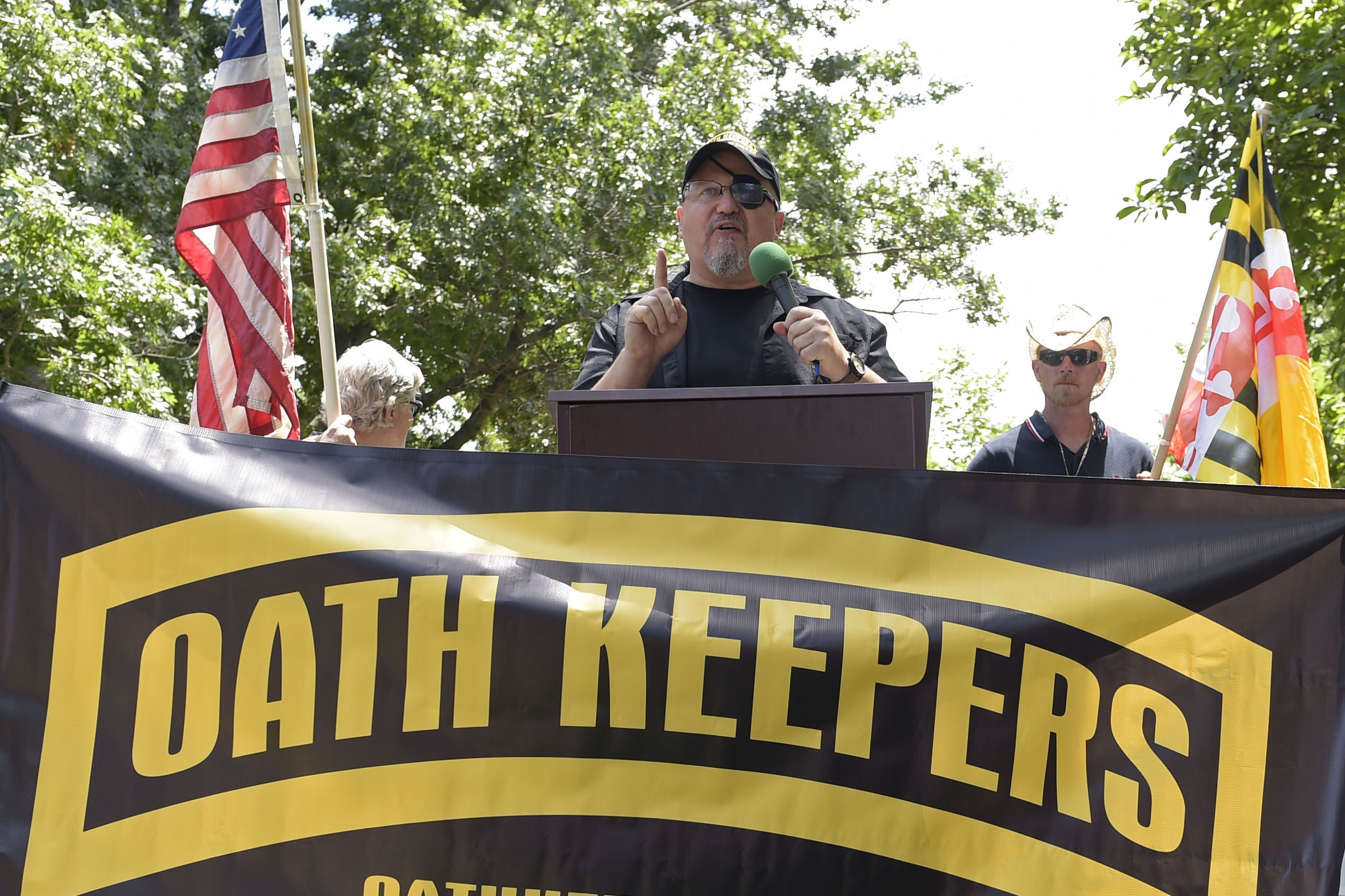 FILE - Stewart Rhodes, founder of the Oath Keepers, center, speaks during a rally outside the White House in Washington, June 25, 2017. Federal prosecutors are preparing to lay out their case against the founder of the Oath Keepers’ extremist group and four associates. They are charged in the most serious case to reach trial yet in the Jan. 6, 2021, U.S. Capitol attack. Opening statements are expected Monday in Washington’s federal court in the trial of Stewart Rhodes and others charged with seditious conspiracy. (AP Photo/Susan Walsh, File)
FILE - Stewart Rhodes, founder of the Oath Keepers, center, speaks during a rally outside the White House in Washington, June 25, 2017. Federal prosecutors are preparing to lay out their case against the founder of the Oath Keepers’ extremist group and four associates. They are charged in the most serious case to reach trial yet in the Jan. 6, 2021, U.S. Capitol attack. Opening statements are expected Monday in Washington’s federal court in the trial of Stewart Rhodes and others charged with seditious conspiracy. (AP Photo/Susan Walsh, File)